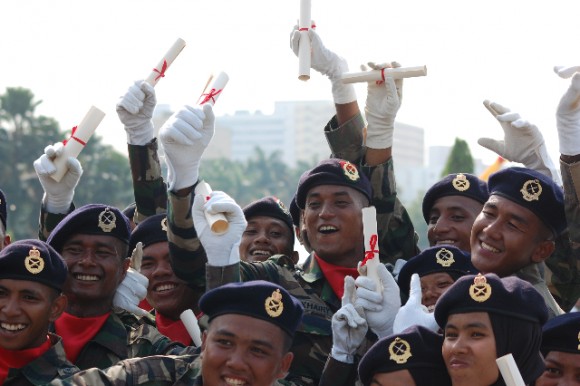by Khairy Jamaluddin | The Nut Graph
I’VE always wanted to join the army. I remember telling my parents as a teenager that I wanted to be a soldier. Maybe it was initially a boys-with-guns thing, or later, a higher calling to serve the nation. There are also generals in my extended family – one was Chief of the Armed Forces. That heightened the appeal.
But after diving into active politics shortly after graduating, my GI Joe dreams were put on the back burner. I settled with the thought that I would perhaps live my commando fantasies through my sons.
Then a few months ago, I met General Shahrom, Commander of the 508 Regiment of the Malaysian Territorial Army or Rejimen Askar Wataniah. He had heard of my interest and wanted to get me involved in his Negeri Sembilan-based regiment. The deal was to use my public-figure endorsement to attract more participation, especially from youths. I wouldn’t have to do much beyond visiting the camp’s recruits to instill them with semangat.
 In return, I would be bestowed an honorary commission, either a Lieutenant Colonel or a Major. I would receive an officer’s accompanying accoutrements, and be saluted by real but lower-ranking soldiers. Ours is a society obsessed with titles and ranks. Undoubtedly, an honorary military commission is another grace awarded to public figures who, mostly, don’t deserve it.
In return, I would be bestowed an honorary commission, either a Lieutenant Colonel or a Major. I would receive an officer’s accompanying accoutrements, and be saluted by real but lower-ranking soldiers. Ours is a society obsessed with titles and ranks. Undoubtedly, an honorary military commission is another grace awarded to public figures who, mostly, don’t deserve it.
Not wanting to offend the commander, I asked, “Sir, if, God forbid, we were ever at war, would the army mobilise their honorary officers?” The answer was, of course, “No.” I then said, “In which case, I don’t deserve to wear the uniform that you’re offering me.” Instead, I asked the commander if I could join as an ordinary recruit and gradually move up the ranks like anyone else.
He said they had never had a sitting Member of Parliament (MP) join as an ordinary recruit, what more one with my “profile”. I convinced him there was a first time for everything.
And so, after General Shahrom convinced an initially skeptical army top-brass that an MP had agreed unequivocally to be treated like any other recruit, I joined the reservist army on 26 April 2010. I reported to the 508 Regiment headquarters in Rasah as 6210405 – my Yang Berhormat-less military number.
Broken down
During the next month, 87 of us were broken down daily through a series of physical and mental challenges. For regular recruits, basic training lasts six months. For reservists, this is condensed into four weeks. While we miss out on a fair bit, the intensity is multiplied because of the shorter period.
As with any military boot camp, the first week is all about the parade square. From dawn till sunset, we were put through marching-in-formation drills, where we learnt the most fundamental lessons about discipline and working as a unit. If just one person stepped out of line or got his or her sequence wrong, the entire squad had to repeat the drill or get down for 20 knuckle push-ups on the boiling tar.
Drill sergeants don’t care about the midday sun or one’s thick, suffocating army-issue camouflage and woolen beret. They keep going even though one by one, recruits fall like dominoes. Some genuinely fainted. Others simulated blackouts. For the record, I did neither. Our breaks were all of five minutes to dash to the cookhouse, where the only drink available was boiling water.
 Unsurprisingly, the first week saw the most dropouts. We lost around 10 recruits. One came back to camp a day after quitting. We later found out he returned because his army father gave him a beating worse than anything he would experience in the barracks.
Unsurprisingly, the first week saw the most dropouts. We lost around 10 recruits. One came back to camp a day after quitting. We later found out he returned because his army father gave him a beating worse than anything he would experience in the barracks.
After taking our stamina to the brink during the first week, classes on handling weapons, military tactics, and army laws and regulations were introduced. We were tested on everything. I hadn’t crammed for written exams in over a decade. Having to switch from extreme physical to mental exertion within just hours was annoying and challenging in equal measure.
Punishments were also generous. From the vomit-inducing side rolls across the parade square’s width, to more subtle but ultimately torturous penalties, we were made to pay for the slightest disciplinary breach. One night, we were subjected to the notorious “change parade”, where we had to run up and down from the square to our dorms to change outfits no less than seven times. The first two changes seemed fun. But on our seventh outfit – full battle dress unit camouflage – past midnight, the urge to just break ranks and quit was overwhelming.
Facing the odds
I also had the added misfortune of being, perhaps for the first time in recent memory, the oldest member of a group. Being 34 in politics is embryonic. As an army recruit its geriatric. The problem was not the training’s academic and tactical aspect, but the physical modules.
I had to keep up with largely 18-year-old kids at the prime of their growth spurts. In anticipation of being embarrassed by younger and fitter recruits, I trained beforehand and dropped 5kg. I would lose another five in camp.
By the time we entered our final week, which involved field exercises in the jungle, we were transforming into soldiers nicely. I no longer needed an alarm to wake up at 4:30am in order to be the first to use one of only four bathing cubicles. We became immune to mosquitoes and the absence of air-conditioning and iced beverages.
Everything up to that point was meant to prepare us for our field exercise. This exercise involved, among other fun and games: a 30km advance; digging a six-feet deep trench in the middle of the day; and carrying a 30kg backpack full of battle rations in addition to our M-16s, our surrogate spouses that we had with us at all times.
 During the exercise, we were paired off with field buddies with whom we would share a trench or tent. I was paired with 19-year-old Rajasekar, a happy-go-lucky odd-job worker from Semenyih. By day, he was an ox with boundless energy. By night, his snores made it clear he wasn’t built for sentry duty. As is the case with relationships forged in challenging circumstances, we continue to be friends.
During the exercise, we were paired off with field buddies with whom we would share a trench or tent. I was paired with 19-year-old Rajasekar, a happy-go-lucky odd-job worker from Semenyih. By day, he was an ox with boundless energy. By night, his snores made it clear he wasn’t built for sentry duty. As is the case with relationships forged in challenging circumstances, we continue to be friends.
What matters
Raja also happened to be one of two non-Malay Malaysians in the entire recruit squad. I was told that the ethnic profile for recruits at other Wataniah regiments in other states were similarly mono-ethnic. This, to me, was the programme’s greatest missed opportunity. By not being able to attract more non-Malay Malaysians, the reservist programme is denied the opportunity to be an effective platform for national unity.
In the army, where one is deconstructed and trained to survive, it doesn’t matter what ethnicity the person in the trench with you is. What matters in battle is that you help each other live and defend your country.
On the day we passed out as Privates, I looked back at the month with obvious relief. No more drills and parades. No more forced marches and trench digging. No more memorising weapons specifications and cleaning a disassembled M-16. But I also looked back with satisfaction that a physical and mental threshold had been crossed.
 More than the personal challenge that the army presents me, it is the fraternity borne of a rigorous, regimented environment and the sense of national service that excites all of us in the reserves. I now look forward to the next phase, whether the officers’ training or the airborne paratrooper course that I have applied to.
More than the personal challenge that the army presents me, it is the fraternity borne of a rigorous, regimented environment and the sense of national service that excites all of us in the reserves. I now look forward to the next phase, whether the officers’ training or the airborne paratrooper course that I have applied to.
Still, I understand why Malaysia has no compulsory military service. Any attempt to build a public consensus to introduce it today would be near impossible. Besides, as attracted as I am to the virtues of military training, I still believe that the decision to enlist or volunteer is an extremely personal one.
Joining the reserves is clearly not for everyone. And I don’t mean that as a reflection on someone’s physical ability, mental resilience or patriotism. Those virtues, especially the last, can be manifested in many different and equally meaningful ways.
In the increasingly cynical world of postmodern Malaysian politics, honour is a diminishing virtue on both sides of the divide. In the army, honour – in particular, the soul-stirring honour of serving your nation – permeates in abundance. For me, that’s the only reason I need to keep reporting back as 6210405.
I’VE always wanted to join the army. I remember telling my parents as a teenager that I wanted to be a soldier. Maybe it was initially a boys-with-guns thing, or later, a higher calling to serve the nation. There are also generals in my extended family – one was Chief of the Armed Forces. That heightened the appeal.
But after diving into active politics shortly after graduating, my GI Joe dreams were put on the back burner. I settled with the thought that I would perhaps live my commando fantasies through my sons.
Then a few months ago, I met General Shahrom, Commander of the 508 Regiment of the Malaysian Territorial Army or Rejimen Askar Wataniah. He had heard of my interest and wanted to get me involved in his Negeri Sembilan-based regiment. The deal was to use my public-figure endorsement to attract more participation, especially from youths. I wouldn’t have to do much beyond visiting the camp’s recruits to instill them with semangat.

Huddling with the platoon (All pics courtesy of Khairy Jamaluddin)
Not wanting to offend the commander, I asked, “Sir, if, God forbid, we were ever at war, would the army mobilise their honorary officers?” The answer was, of course, “No.” I then said, “In which case, I don’t deserve to wear the uniform that you’re offering me.” Instead, I asked the commander if I could join as an ordinary recruit and gradually move up the ranks like anyone else.
He said they had never had a sitting Member of Parliament (MP) join as an ordinary recruit, what more one with my “profile”. I convinced him there was a first time for everything.
And so, after General Shahrom convinced an initially skeptical army top-brass that an MP had agreed unequivocally to be treated like any other recruit, I joined the reservist army on 26 April 2010. I reported to the 508 Regiment headquarters in Rasah as 6210405 – my Yang Berhormat-less military number.
Broken down
During the next month, 87 of us were broken down daily through a series of physical and mental challenges. For regular recruits, basic training lasts six months. For reservists, this is condensed into four weeks. While we miss out on a fair bit, the intensity is multiplied because of the shorter period.
As with any military boot camp, the first week is all about the parade square. From dawn till sunset, we were put through marching-in-formation drills, where we learnt the most fundamental lessons about discipline and working as a unit. If just one person stepped out of line or got his or her sequence wrong, the entire squad had to repeat the drill or get down for 20 knuckle push-ups on the boiling tar.
Drill sergeants don’t care about the midday sun or one’s thick, suffocating army-issue camouflage and woolen beret. They keep going even though one by one, recruits fall like dominoes. Some genuinely fainted. Others simulated blackouts. For the record, I did neither. Our breaks were all of five minutes to dash to the cookhouse, where the only drink available was boiling water.

At the shooting range
After taking our stamina to the brink during the first week, classes on handling weapons, military tactics, and army laws and regulations were introduced. We were tested on everything. I hadn’t crammed for written exams in over a decade. Having to switch from extreme physical to mental exertion within just hours was annoying and challenging in equal measure.
Punishments were also generous. From the vomit-inducing side rolls across the parade square’s width, to more subtle but ultimately torturous penalties, we were made to pay for the slightest disciplinary breach. One night, we were subjected to the notorious “change parade”, where we had to run up and down from the square to our dorms to change outfits no less than seven times. The first two changes seemed fun. But on our seventh outfit – full battle dress unit camouflage – past midnight, the urge to just break ranks and quit was overwhelming.
Facing the odds
I also had the added misfortune of being, perhaps for the first time in recent memory, the oldest member of a group. Being 34 in politics is embryonic. As an army recruit its geriatric. The problem was not the training’s academic and tactical aspect, but the physical modules.
I had to keep up with largely 18-year-old kids at the prime of their growth spurts. In anticipation of being embarrassed by younger and fitter recruits, I trained beforehand and dropped 5kg. I would lose another five in camp.
By the time we entered our final week, which involved field exercises in the jungle, we were transforming into soldiers nicely. I no longer needed an alarm to wake up at 4:30am in order to be the first to use one of only four bathing cubicles. We became immune to mosquitoes and the absence of air-conditioning and iced beverages.
Everything up to that point was meant to prepare us for our field exercise. This exercise involved, among other fun and games: a 30km advance; digging a six-feet deep trench in the middle of the day; and carrying a 30kg backpack full of battle rations in addition to our M-16s, our surrogate spouses that we had with us at all times.

With Rajasekar, digging a trench
What matters
Raja also happened to be one of two non-Malay Malaysians in the entire recruit squad. I was told that the ethnic profile for recruits at other Wataniah regiments in other states were similarly mono-ethnic. This, to me, was the programme’s greatest missed opportunity. By not being able to attract more non-Malay Malaysians, the reservist programme is denied the opportunity to be an effective platform for national unity.
In the army, where one is deconstructed and trained to survive, it doesn’t matter what ethnicity the person in the trench with you is. What matters in battle is that you help each other live and defend your country.
On the day we passed out as Privates, I looked back at the month with obvious relief. No more drills and parades. No more forced marches and trench digging. No more memorising weapons specifications and cleaning a disassembled M-16. But I also looked back with satisfaction that a physical and mental threshold had been crossed.

Still, I understand why Malaysia has no compulsory military service. Any attempt to build a public consensus to introduce it today would be near impossible. Besides, as attracted as I am to the virtues of military training, I still believe that the decision to enlist or volunteer is an extremely personal one.
Joining the reserves is clearly not for everyone. And I don’t mean that as a reflection on someone’s physical ability, mental resilience or patriotism. Those virtues, especially the last, can be manifested in many different and equally meaningful ways.
In the increasingly cynical world of postmodern Malaysian politics, honour is a diminishing virtue on both sides of the divide. In the army, honour – in particular, the soul-stirring honour of serving your nation – permeates in abundance. For me, that’s the only reason I need to keep reporting back as 6210405.














 KUALA LUMPUR, June 16 — The government today denied that it has been backing the Malay rights group Perkasa, adding that administration does not focus solely on any ethnic group.
KUALA LUMPUR, June 16 — The government today denied that it has been backing the Malay rights group Perkasa, adding that administration does not focus solely on any ethnic group. By Rahmah Ghazali - Free Malaysia Today,
By Rahmah Ghazali - Free Malaysia Today, "People will think that DAP is trying to punish the state reps or benefit from this contract. But these people must not benefit from betraying the voters.
"People will think that DAP is trying to punish the state reps or benefit from this contract. But these people must not benefit from betraying the voters.
 By G Vinod - Free Malaysia Today,
By G Vinod - Free Malaysia Today, On a sarcastic note, Azmin asked when the government proposed to sell the Ministry of Defence, Bukit Aman and Putrajaya.
On a sarcastic note, Azmin asked when the government proposed to sell the Ministry of Defence, Bukit Aman and Putrajaya.
